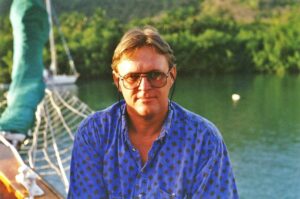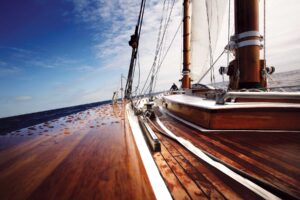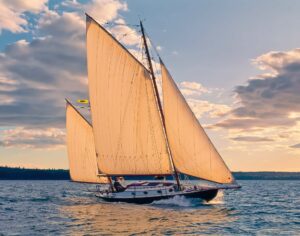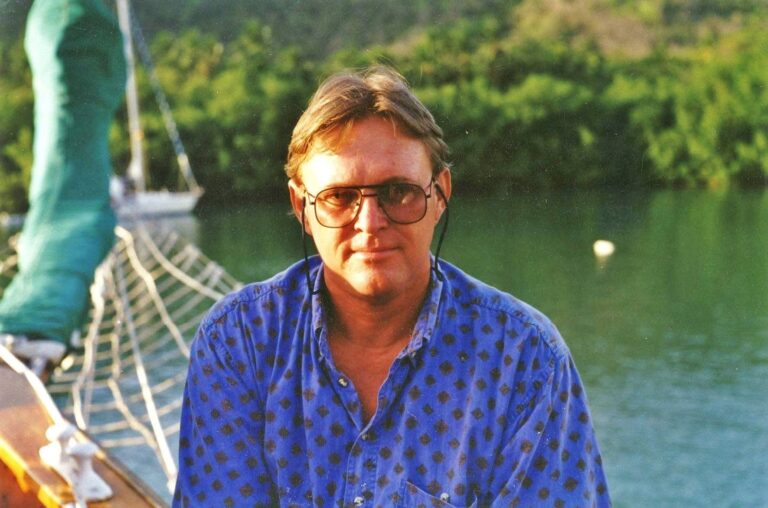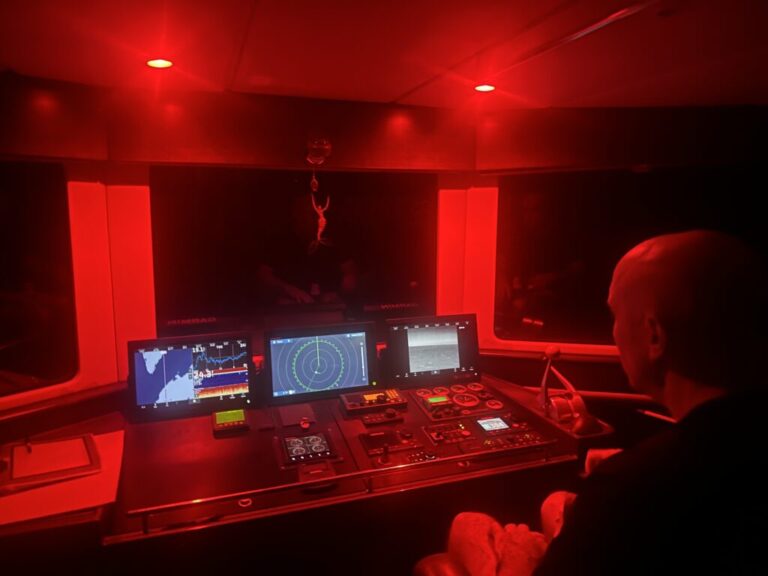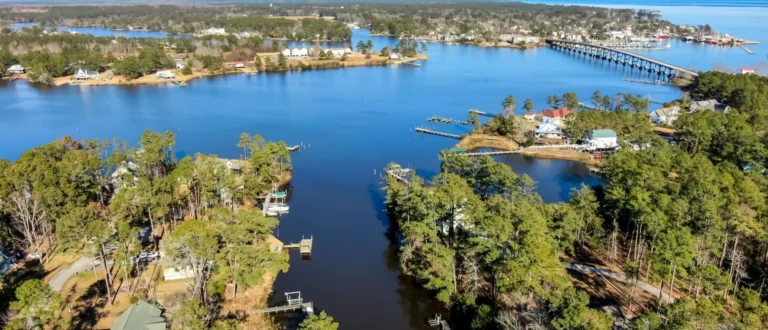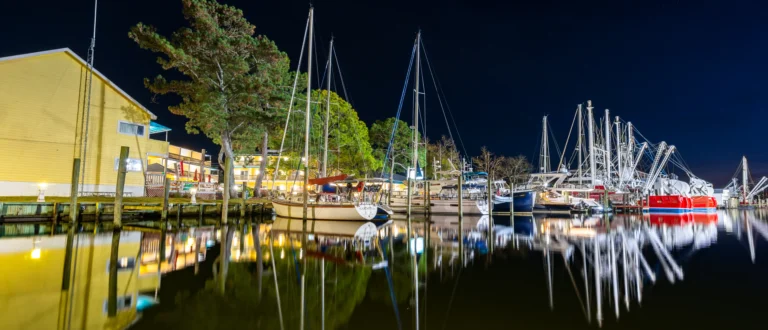
Caption: Phil Thompson (left) with a mate holding the cobia he’d caught.
I read a novel over the weekend to keep a promise. The author was a rare guy. Besides being a natural-born storyteller, Phil Thompson was a sailor, sport fisherman and environmentalist. He was also a hopeless romantic. He gave me a copy of 97 Miles South in April 2016 as we shared a table at his favorite haunt, the Hemingway International Yacht Club in Havana, Cuba. The book had waited for me on the shelf ever since.
Thompson, 68, died last month from an acute heart attack. Sad enough, but the word spread on Facebook was that he had been found hanged at a Cuban beach. Though it sounds clichéd, his many friends, myself among them, really were shocked and saddened. We were saddened by his death and shocked at the notion of suicide.
Thompson and I weren’t exactly friends, more like regular acquaintances, conversing at the club bar whenever I visited Havana. Regardless of the nature of our relationship, however, I felt I should keep my promise. Only after I had finished 97 Miles South and had started writing this blog did I learn that Thompson’s passing was from natural causes. I have a feeling he would have been much amused at the confusion.
The plot of the book is built around an American sportfishing team that takes a boat to Havana to compete in the annual Hemingway International Billfish Tournament. The protagonist is a guy named Pete, who reminded me of Thompson himself. In the story, the new American arrivals find splendid adventure in Havana, not the least of which involves interacting with the natives. One Cuban character is an accomplished hustler, who, among other things, has learned how to manufacture satellite dishes for the black market.

Our man Pete falls for a younger Cuban elementary school teacher who moonlights as what may be politely described as an “escort.” Pete’s nemesis is a jealous Cuban secret police colonel, whose conniving drives the plot to its dramatic conclusion. Along the way, rum flows and big fish are caught.
I’ve been traveling to Cuba for 15 years as a boating journalist, so I have a little perspective. No book, no writing has better captured such a peculiar moment in the history of neighboring nations. Someone once said that if you want to understand the Napoleonic wars, your best resource is Tolstoy’s great work of fiction not the history books. If you want to understand how Cuba intersects with the U.S. and things nautical, 97 Miles South is your War and Peace. The book was published in 2012 and though much has changed in the short time since, Thompson’s observations hold up remarkably well.
“Cuba was trapped under an invisible dome of isolation,” he wrote. “Chevrolets and Cadillacs, plying the streets of Havana, dated the closure of the cage door that imprisoned the Cuban society. Deprived contacts and freedoms required to evolve with the modern world, the Cuban people bicycled through the jet age. Electricity without light switches, televisions with rabbit-eared antennas, flush toilets minus paper and seats—these were the accoutrements of the first communist dictatorship in the Western Hemisphere.”
I also enjoyed this spot-on observation, written in Hemingway-esque fashion:
“Fat Henry liked the Americans. Looking upon them as neighbors, he found them kinder and more generous than the Europeans or rich Latinos that comprised most of his clientele. He had no memory of the time before the revolution and harbored no ill will or fear of the Anglos coming to his country to rent his rooms, buy his rum or sleep with his country’s women. Fat Henry saw only the opportunity of commerce and profit, and it pleased him and gave him hope for the future.”
Admittedly I’m pretty unsophisticated as an angler, but the exchange below rang true to me. The American captain, Travis, wants to know why a Cuban captain at the helm pulled a particular maneuver, so he asks their English-speaking hustler/guide to translate:
“I need you to ask Jose why he increased the speed of the boat today when the fish first appeared and turned away. This goes against everything I’ve ever been taught about marlin fishing.”
Fito posed the question and listened attentively while the Cuban captain explained, gesturing from time to time with both hands.
“He says, Travis, that when the marlin first came to the bait, the fish expected the bait to run faster to get away, and when they did not, the fish did not understand,” Fito explained. “So, Jose speeded up the boat to make the fish think the baits were afraid, like real fishes would be. Then, when he slowed down, that was like the real fishes would do when they believed the big fish went away. The big fish waited for them to slow down, then attacked. He did it to fool the big fish into thinking they were real fishes.”
“I’ll be damn,” Travis said.
The last time I talked with Thompson was in May 2018. He seemed happy, though he complained mightily about the recent turn in American politics. He said he was busy promoting eco-tourism and fly-fishing in partnership with an innovative Cuban guide named Felipe Alonso. That’s why the idea of his suicide had seemed so inexplicable to me.
Isabel Gomez, the translator at the Hemingway International Yacht Club, is a friend to both of us, and a far more sensitive observer than I. Before the facts of his death came out, all that she could offer was that Thompson had seemed a bit more depressed than usual. “I do not know, and I do not understand very well either,” Gomez wrote. “Alone, without children, without something to do and nothing to expect…I am deeply sorry.”
Thanks to a Cuban medical examiner’s report, the rumors of suicide were put to rest. But a loss was still a loss. “We used to talk about pollution in the oceans, teaching fishing to young generations and so many other related topics,” Gomez said. “He spoke loudly, and you would know he was around even without seeing him. Now there is an empty space here at the club.”
One of Thompson’s best friends was a Cuban captain. On Nov. 2, “El Chino” carried Thompson’s ashes past the sea buoy at Marina Hemingway and spread them into the waters of the Gulf Stream, that great ocean river of life. On Nov. 10, a memorial service was held at Sun City, the area in Florida just south of Tampa where Thompson was raised to be a catcher of fish, lover of women and a fine teller of tales.

